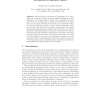Free Online Productivity Tools
i2Speak
i2Symbol
i2OCR
iTex2Img
iWeb2Print
iWeb2Shot
i2Type
iPdf2Split
iPdf2Merge
i2Bopomofo
i2Arabic
i2Style
i2Image
i2PDF
iLatex2Rtf
Sci2ools
PPSN
2010
Springer
2010
Springer
Optimisation and Generalisation: Footprints in Instance Space
Abstract. The chief purpose of research in optimisation is to understand how to design (or choose) the most suitable algorithm for a given distribution of problem instances. Ideally, when an algorithm is developed for specific problems, the boundaries of its performance should be clear, and we expect estimates of reasonably good performance within and (at least modestly) outside its ‘seen’ instance distribution. However, we show that these ideals are highly over-optimistic, and suggest that standard algorithm-choice scenarios will rarely lead to the best algorithm for individual instances in the space of interest. We do this by examining algorithm ‘footprints’, indicating how performance generalises in instance space. We find much evidence that typical ways of choosing the ‘best’ algorithm, via tests over a distribution of instances, are seriously flawed. Also, understanding how footprints in instance spaces vary between algorithms and across instance space dimensions, m...
Algorithms | Distributed And Parallel Computing | Instance Space | Instance Space Dimensions | PPSN 2010 |
| Added | 29 Jan 2011 |
| Updated | 29 Jan 2011 |
| Type | Journal |
| Year | 2010 |
| Where | PPSN |
| Authors | David W. Corne, Alan P. Reynolds |
Comments (0)

